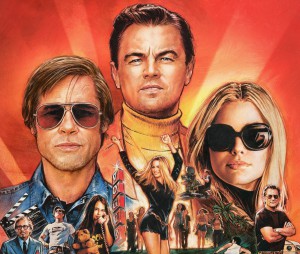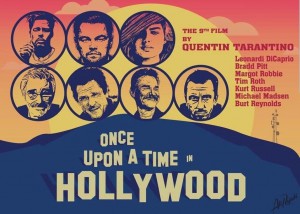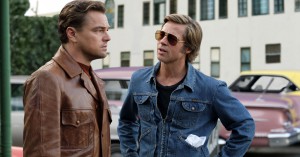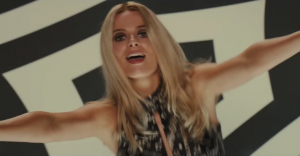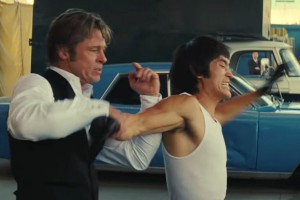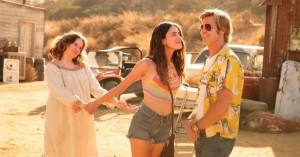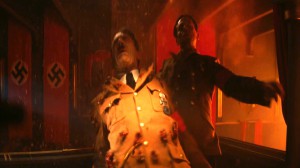The Spanish monthly film magazine that I write for, Caiman Cuadernos de Cine, invited me in the summer of 2019 to expand on my latest column for them as well as a few Facebook posts about Tarantino’s Once Upon a Time in Hollywood. Here is the result. — J.R.
Has 9/11 or the war on terror had any impact on you personally or creatively?
9/11 didn’t affect me, because there’s, like, a Hong Kong movie that came out called Purple Storm and it’s fantastic, a great action movie. And they work in a whole big thing in the plot that they blow up a giant skyscraper. It was done before 9/11, but the shot almost is a semi-duplicate shot of 9/11. I actually enjoyed inviting people over to watch the movie and not telling them about it. I shocked the shit out of them. But, again, I was almost thrilled by that naughty aspect of it. It made it all the more exciting.
But on some level you must have been caught up in the reality of 9/11.
I was scared, like everybody else. “OK, what is this new world we’re going to be living in? Is it going to be fucking Belfast here?” And I didn’t want to fucking fly nowhere. I remember thinking at the time — this was when they were shooting the Matrix sequels in Australia — “What if everything, all this shit, breaks out, man? And all that’s left in Hollywood are the Matrix people? That would be a fuckin’ drag” [laughs].
—Quentin Tarantino in Rolling Stone(October 2003)
In a television interview conducted the day of the attack, [Donald] Trump infamously went out of his way to mention that following the collapse of the World Trade Center, his Forty Wall Street building in Lower Manhattan was suddenly the tallest in the area.
“Forty Wall Street actually was the second-tallest building in downtown Manhattan, and it was, actually, before the World Trade Center, was the tallest,” he said. “And then when they built the World Trade Center it became known as the second-tallest, and now it’s the tallest.”
Trump has also on numerous occasions used the attacks to whip up Islamophobic sentiment. He falsely claimed during a 2015 interview that on the day of the attacks, he witnessed “thousands and thousands of people cheering” as the towers fell — his implication being that Muslims were celebrating. Just this April, Trump posted an edited video to Twitter trying to link one of America’s first Muslim congresswomen, Rep. Ilhan Omar (D-MN), with the attackers.
—Vox (July 2019)
These two declarations that reality can be reduced (or elevated)
to the status of competitive media profiles — such as who has the
better disaster (or movie) or the bigger skyscraper (or penis) —
may help to explain why Tarantino’s Once Upon a Time in
Hollywood arguably embodies Trump’s slogan, “Make America great
again.” For Tarantino, 9/11 is a matter not of lives but of shots; for
Trump, it’s who has the taller skyscraper — another media trope.
For both, it’s what’s on the computer or TV or movie screen that
counts, not unfilmable lost lives or unphotogenic corpses.
Tarantino’s formative years were spent in video rentals, Trump’s in
“reality TV” — two worlds devoted to leisure activity perceived as a
relief from reality.
Tarantino’s melancholy epic also conveys middle-aged nostalgia
for the presumed innocence of the 1950s, before hippies existed
and when someone like Sharon Tate could be guiltlessly cherished
as a bimbo who always knew when to keep her mouth shut. It also
celebrates the 1960s American practice of using napalm, or, in the
case of racist Southern law enforcers, high-powered water hoses
against diverse undesirables — with the war in Vietnam and the civil
rights struggle mostly rendered as faint background noise to the
tender handling of the travails of two over-the-hill white action heroes.
Within such a narrow context, a flame-thrower can function joyfully
as a Return of the Repressed. Overall, it’s a fantasy that seems quite
compatible with the desire of many Trump supporters to gain respect
for their revenge fantasies against both arrogant foreigners (Bruce Lee
is one of the movie’s comic fall guys) and crazed “hippies” (associated
almost exclusively with Charles Manson’s gang of assassins — a rough
counterpart to Trump associating Ilhan Omar with 9/11 terrorists.)
The desire to return to a state of innocence is an essential
part of the popularity of what I take to be the Trump/
Tarantino position. I hasten to add that this doesn’t mean
that I find their separate positions identical or necessarily
even similar in many particulars. Just for starters, both claim
to be nonracist, although Tarantino’s claim to such is far more
plausible than Trump’s, and the differences between their
class backgrounds are considerable. Yet they’re still joined at the
hip by their compatible views of the world and the media as
interchangeable and indistinguishable from one another. They’re
both fond of grand theatrical gestures that smack of sadistic
entitlements, even though Tarantino’s gestures are of course all
make-believe and Trump’s often play out in the real world, with
real-life consequences. If Tarantino’s world is pointedly theoretical,
avowedly a fairy tale, contrived to create fears only to dissipate
them — first with a dented car, then with a few corpses, all enhanced
by what passes for his good cheer and his affection for some losers —
Trump’s practice might be seen as an attempt to fulfill some (if not all)
of these suppositions by creating or stoking the same sort of fears
without trying to dissipate them, keeping them operative. Media power
and what might derive from it remains the final objective in both cases,
and retributive hatred remains an essential ingredient in activating it.
Tarantino’s utopian conclusion would be unthinkable
without his previous animation of the audience’s dread
in anticipating the Manson murders — using real-life horror
as a form of entertainment pay dirt, as he did with Nazism
in Inglorious Basterds and with slavery in Django Unchained.
One might even say that he needs his imaginary Nazis and
slave-owners as much as Trump needs his imaginary rapists
and shit-holes, to establish his authority for creating a better
future, to “make America great again”. But only media mavens
need apply.
..

